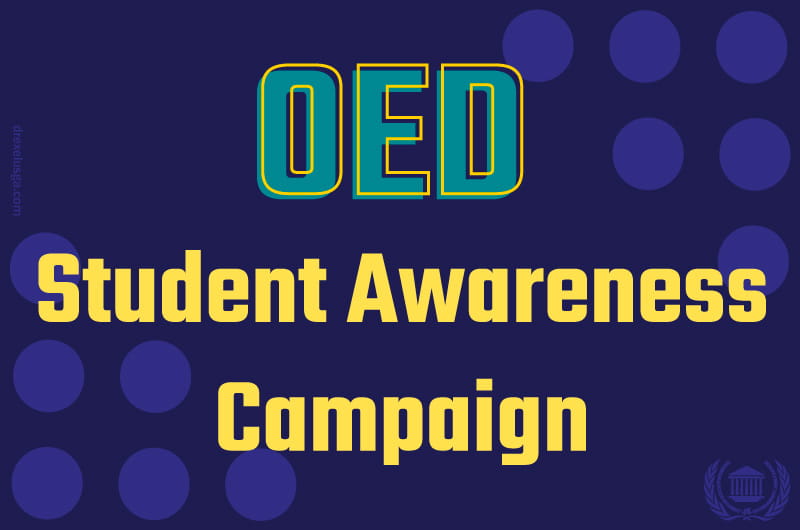OED's Here For You Student Campaign: Overview of Title IX Resources


Drexel’s Office of Equality and Diversity (OED), in partnership with the Undergraduate Student Government Association, the Student Center for Diversity and Inclusion, and University Communications, is excited to announce the launch of our OED's Here For You Campaign. We know there have been questions surrounding OED’s terminology (“What is Title IX?” “What is OED-1?”) and services (“How can OED help me?” “Where can I find the right resources?”). This campaign aims to boost student awareness of the Office of Equality and Diversity, the University resources available to community members impacted by sexual harassment or sexual misconduct, the Sexual Harassment and Misconduct Policy, which was updated in August 2020, and Title IX, the federal law addressing sexual harassment on campus. Keep your eye out for student-focused communications and community events on these topics. Please make sure to check future DrexelNow editions and the OED website for more information, and don’t forget to follow USGA on Instagram, Facebook or Twitter (@DrexelUSGA).
OVERVIEW OF OED SERVICES/RESOURCES
OED plays a vital role in Drexel University’s efforts to foster a safe, healthy, equitable and inclusive educational and employment environment built on mutual respect and trust. The handling of Title IX, sexual harassment and misconduct is a big part of OED, but it’s not the only way we’re here to help. To kick off this campaign, here’s some information about what OED is, how we can be a resource to you during your time at Drexel, and the services we provide.
What's the Office of Equality and Diversity?
Drexel’s Office of Equality and Diversity is the primary office responsible for ensuring that the University complies with its own policies and with laws that prohibit discrimination and harassment based upon race, color, religion, gender, pregnancy, national origin, age, disability, sexual orientation, identity and expression, and veteran status. One of OED’s key responsibilities is overseeing the University’s Sexual Harassment and Misconduct Policy, which addresses the University’s response to allegations and instances of sexual assault, sexual violence, dating and domestic violence, stalking, and sexual misconduct on campus. OED is also responsible for overseeing the University's Discrimination, Harassment and Bias Incident Prevention Policy.
In addition to investigating complaints of alleged misconduct, OED utilizes various conflict resolution processes to address reports of discrimination, harassment and retaliation. OED also ensures that, regardless of whether they want to file a complaint or take part in an investigation process, individuals impacted by incidents of sexual harassment, sexual misconduct, or other forms of harassment or discrimination are provided with the support and resources they need.
How can OED help me?
It’s useful to know what we do and how we can help in case you or someone you know needs us or the services we offer! Here are five major services that OED offers to the Drexel community.
1: Answering Questions and Providing Resources
OED’s door is always open. We are available to speak or meet with anyone in the Drexel community who has questions about OED processes and policies or who has been impacted by sexual harassment or misconduct, discrimination, bias incidents or other behavior or actions that may involve issues related to diversity, equity and inclusion.
However, you don’t have to be confronting a serious issue to talk to OED! We are proud to serve as a resource, even if you’re not sure whether a concern you have is an “OED issue.” If we are not able to help, we can direct you to the right place on campus or in the community. We act as a liaison and serve as a partner to a wide variety of departments, groups and initiatives on campus, including USGA, Greek Life, Housing and Residential Life, the Counseling Center, Graduate Studies, Faculty Affairs and more. You should also know that our office respects the agency of our community members, and we will closely protect the privacy of any information that you share with us.
2: Providing Support
OED can provide various types of support if you have been impacted by sexual harassment or sexual misconduct, or by other forms of discrimination, harassment or bias. We can help you request academic, residential, disability or religious accommodations, provide you with information about options for resolving an issue through OED’s informal or formal resolution processes, and connect you with community resources such as legal organizations, medical providers and support groups. We can also help you create safety plans, understand your rights and talk through your options.
3: Conflict Resolution
Students often come to us with issues they’d like help addressing or resolving, and we will often work to identify solutions that are specific to your situation and needs. Here are some examples of how we may be able to help:
- We can help parties have a facilitated dialogue or mediation through a trained mediator or neutral third party.
- In certain circumstances, we may be able to relay concerns from one person to another, including anonymously.
- We can have an educational discussion with an individual who is alleged to have engaged in conduct that negatively impacted someone else.
- We can assist individuals in requesting, obtaining or negotiating agreements that limit or prevent communication with another person.
4: Investigating Reports of Misconduct
OED also carries out investigations into complaints of sexual harassment or sexual misconduct and works to ensure that individuals found responsible for these behaviors are held appropriately accountable for their actions. OED is staffed with investigators specifically trained to conduct investigations in a manner that is fair, thorough and sensitive to the traumas experienced by survivors of these incidents. The investigative process involves specific procedural steps and adheres to a specific timeline, both of which are outlined in more detail in the University’s Sexual Harassment and Misconduct Policy and the Discrimination, Harassment and Bias Incident Prevention Policy. If an individual is found responsible for acts of sexual harassment or sexual misconduct, OED will work with Student Conduct or Human Resources (depending on whether the responsible party is a student, faculty member, or professional staff member) to ensure that they are sanctioned and that the survivor is provided with appropriate remedies and support. If you ever have any questions about our processes or the procedural options that may be available, we are always happy to talk.
5: Education, Prevention and Programming
The Office of Equality and Diversity provides educational offerings upon request that are culturally relevant, promote an inclusive campus culture and support our overarching goal of mitigating incidents of bias, discrimination, sexual misconduct and harassment.
We can provide training to anyone in the University community including students, faculty, professional staff, organizations, athletic groups, Greek organizations and departments in a variety of topics, including but not limited to: bias, microaggressions, allyship and inclusive culture. To learn more about program offerings currently available and to request workshops and other programming, visit the Training and Education section of the OED website.
As we begin this new term and year, please remember that OED is here for you! You can always view our website (drexel.edu/oed) for more information, email us at oed@drexel.edu or call us at 215.895.1405. Beginning Jan. 19, we will have at least one staff member in our office at 3225 Arch Street, Suite 011, from Monday to Friday, 9 a.m. to 5 p.m.